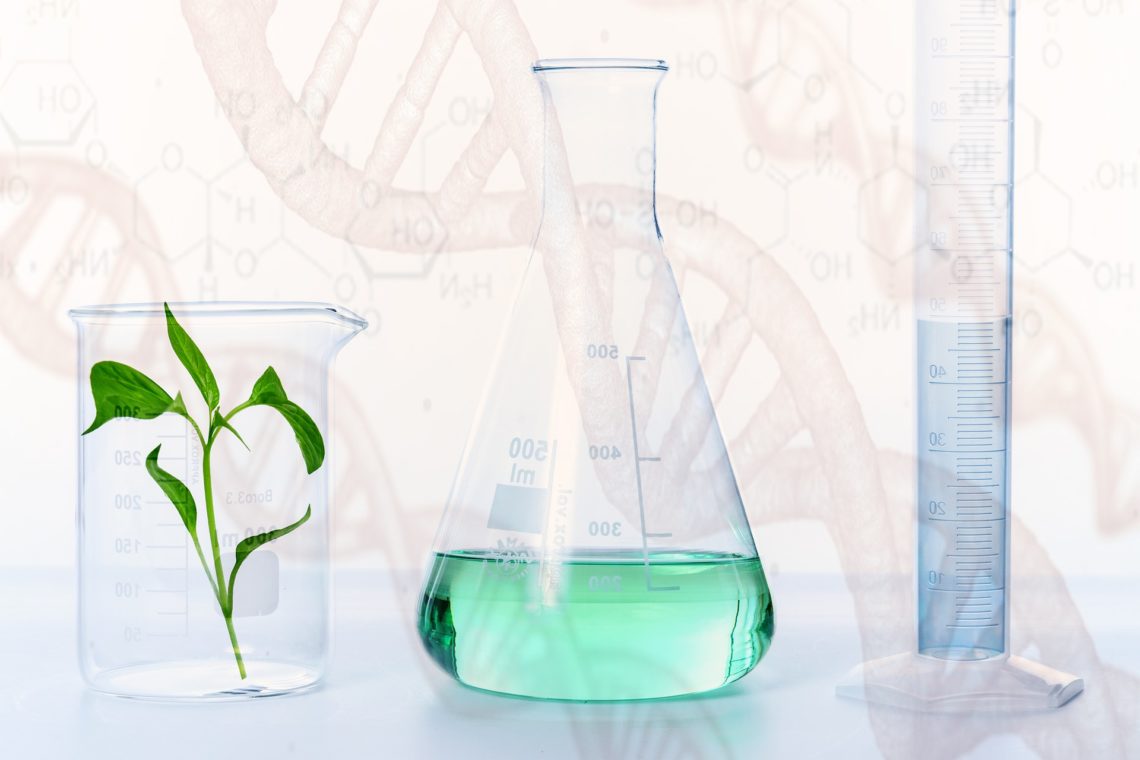By Suann R. Endicott
Genetically modified organisms (GMOs): some people may know about them and some may not. In fact, they can be difficult to learn about. After doing extensive research, I was left with the question: Why does the FDA approve foods like GMO’s with only the studies provided by the companies that manufacture them and without any independent reviews, even from their own scientists? Furthermore, why won’t the biotechnology companies allow independent studies of their products? Lastly, why are the big corporations against labeling products that have GMO’s? Doesn’t “gene-editing” feel like the GMO industry is playing God with our food? It does to me. Essentially, a money-driven system such as capitalism has no business taking over our food and agriculture industry. I feel we have a responsibility to educate ourselves and make informed choices.
A GMO is defined as: “an organism or microorganism whose genetic material has been altered by means of genetic engineering (GE)” (Dictionary, 2020). The most common GMO crops are corn, soy, yellow and zucchini squash, alfalfa, canola, sugar beets and milk (Young, 2019). Many of the corn and soybean gene modifications are to protect the plant to be herbicide and pesticide resistant (Young, 2019). One example is corn strains that have been modified to kill the worms that try to eat them, in which case the biotechnology companies have added a gene of pesticide into the DNA—they call it “pest resistant.” Such GMO’s have been marketed to farmers to have better yields and less loss to pests (“Genetically Modified Food,” 2020). There are many unknowns to changing DNA to add a pesticide to kill worms and bugs. If it kills worms and bugs, what does it do to humans and animals over time? There has not been enough peer reviewed research to confirm that these changes are safe.
The Food and Drug Administration (FDA), for its part, relies on a company like Monsanto’s to provide evidence that their product is safe—called “voluntary industry self-regulation”—and does not require any additional studies or research performed by outside scientists. This is despite the fact that many scientists who worked for the FDA have called for more rigorious data to be presented by the companies before being released to the market (Fagan, Antoniou, & Robinson, 2014). David Schubert, head of the Cellular Neurobiology Laboratory, Salk Institute made this statement about the GMO approval process:
One thing that surprised us is that US regulators rely almost exclusively on information provided by the biotech crop developer, and those data are not published in journals or subjected to peer review… The picture that emerges from our study of US regulation of GM foods is a rubber-stamp ‘approval process’ designed to increase public confidence in, but not ensure the safety of, genetically engineered foods. (Fagan, Antoniou, & Robinson, 2014).
Due to patents on the GMO seeds themselves, it makes it very difficult to conduct testing because anyone who wants to test them must ask the company for permission first (“GMO Awareness,” 2011). I don’t think it’s a surprise that this permission has never been granted; it makes me as a consumer wonder why they will not allow independent testing, if their products are safe. Permissions have only been granted to companies that have positive outcomes from the GMO’s (“GMO Awareness”, 2011). For example, there is a conflict of interest rate of 100% in all scientific tests performed that shows positive results for GMO’s—41 out of 41 tests (“GMO Awareness”, 2011). Either the companies were funded by biotechnology or had ties to biotechnology companies. Doug Gurian-Sherman, plant pathologist and senior scientist at the Union of Concerned Scientists stated:
“We don’t have the complete picture. That’s no accident. Multibillion-dollar agricultural corporations, including Monsanto and Syngenta, have restricted independent research on their genetically engineered crops. They have often refused to provide independent scientists with seeds, or they’ve set restrictive conditions that severely limit research options.” (“GMO Awareness”, 2011).
Furthermore, those scientists who have managed to carry out such research and have found risks from the genetically modified organism tested have suffered persecution. Some have paid with their careers and funding (Fagan, Antoniou, & Robinson, 2014). So, it is no surprise that 19 out 27 of the European countries have either banned partially or fully banned GMO’s (European Green Capitol, n.d.).
Those in support of GMO’s state that we need these crops to keep up with climate change. Biotech companies are in the process of genetically modifying plants to be drought resistant or give plants more tolerance to cold weather (Heikkinen, 2016).The second big push is in solving world hunger, as the improvements of pest resistance and climate change durability will in turn produce more food (Heikkinen, 2016). This may all be true, but there is still so much uncertainty to these claims due to the lack of independent testing by scientists who are not somehow attached to the biotech companies.
In light of these benefits, I would still like to ask why biotech companies are so against labeling—do we not deserve transparency in what we are eating? Below is an example of how much money companies have spent in the last year in anti-labeling lobbying campaigns. The companies include: Monsanto, Coke-a-Cola, Pepsi, General Mills, and Kraft to name the top contributors (Cornucopia Institute, 2020):
Big Food interests and their allies in the biotech industry opposing the consumer’s “right-to-know” outspent the Yes side $32 million to $12 million in Colorado and Oregon. Over the past three years, including the two previous, similar referendums in California and Washington, corporate interests have outspent the pro-labeling supporters $100 million to $29 million. (Cornucopia Institute, 2020).
In Europe, GMO labeling is required on all food products. Furthermore, studies have shown people prefer and purchase more items that are Non-GMO (Cornucopia Institute, 2020). I am not a scientist or an economist, but I don’t think it is a long shot to say these companies are afraid of losing business due to labeling.
I fully support organizations such as the Non-GMO Project, who advocate for proper labeling of foods containing GMO’s. They believe that everyone has a right to know what is in their food, and so encourage us all to vote with our dollar—to name just a couple of their goals (Non-GMO Project, 2016). The Non-GMO Project was created in 2007 by two grocery stores—one in California and one in Ontario—that rallied 161 other stores that also wanted to provide their customers with safe food. The Non-GMO Project launched a Product Verification Program, which means products must pass a rigorous testing before being awarded “the Butterfly” to show they are certified non-GMO (Non-GMO Project, 2016). As a result, over the last 13 years, there have been more than 60,000 products verified as GMO-Free and 14,349 retailers registered nationwide (Non-GMO Project, 2020).
Although it is our individual responsibility to do our own research and come to our own conclusions, we still deserve to know everything about what is in our food. Ignorance is not bliss, especially when it comes to health and safety. Over the last several years I have watched many documentaries on food and GMO’s, this is a topic I have am passionate about. I have made a lot of changes in my life, mostly in what I choose to purchase. Voting with our dollar is the most powerful thing we can do. I would say that the simple fact that there is so much secrecy, avoidance and lack of transparency from biotechnology companies can only lead me to one conclusion: they do not have our safety in mind. The fact that they fought labeling so hard can only lead me to believe they are hiding the truth. This is important because we are all affected, and we will not know the true implications for another 20-30 years—and with a zero-accountability system, Big Food will get away with it.
References
Cornucopia Institute. (2020, April 5). Biotech and agribusinesses spending heavily to defeat state GMO food labeling votes. Cornucopia News. https://www.cornucopia.org/2015/03/biotech-agribusinesses-spending-heavily-defeat-state-gmo-food-labeling-votes/
Dictionary. (2020). GMO. In Dictionary.com. Retrieved March 27, 2020, from https://www.dictionary.com/browse/gmo?s=t
European Green Capitol. (n.d.). Several European countries move to rule out GMOs. European Commission. https://ec.europa.eu/environment/europeangreencapital/countriesruleoutgmos/
Fagan, J., Antoniou, M., & Robinson, C. (2014). GMO myths and truths. 2nd ed, ver 1.0. http://livingnongmo.org/wp-content/uploads/2014/11/GMO-Myths-and-Truths-edition2.pdf GMO Awareness. (2011).
GMO science, sources and relationships. https://gmo-awareness.com/all-about-gmos/gmo-science-sources-relationships/
Heikkinen, N. (2016, May 18). Genetically engineered crops are safe and possibly good for climate change. Scientific American. https://www.scientificamerican.com/article/genetically-engineered-crops-are-safe-and-possibly-good-for-climate-change/
Non-GMO Project. (2016). History. https://www.nongmoproject.org/about/history/
Non-GMO Project. (2020). Living Non-GMO. https://livingnongmo.org/
Genetically modified food. (2020, March 20). Wikipedia. Retrieved March 27, 2019, from https://en.wikipedia.org/wiki/Genetically_modified_food
Young, C. (2017, December 6). The Blog: 7 most common genetically modified foods. HuffPost . https://www.huffpost.com/entry/diet-and-nutrition_b_4323937





